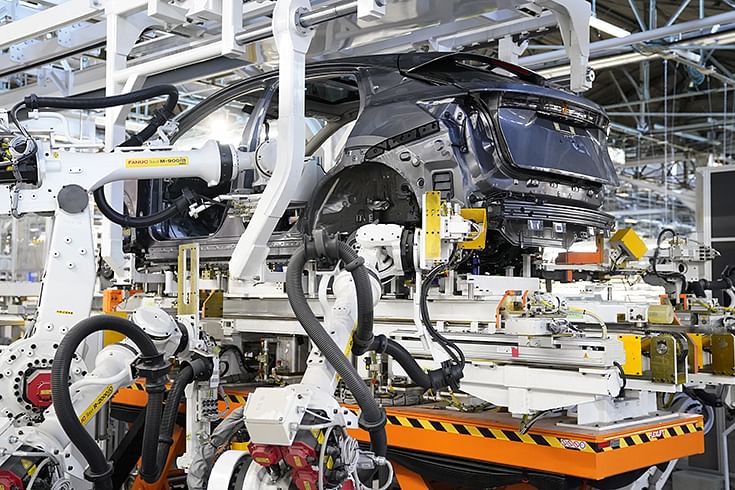Nissan’s intelligent factory replicates 'takumi' skills at Tochigi plant
Uses robots with the skills of 'takumi' or master-technicians to manufacture next-gen vehicles of the highest quality and also realise a zero-emission production system
Nissan today unveiled a production line at its Tochigi Plant featuring the Nissan Intelligent Factory initiative.
This initiative supports the manufacture of next-generation vehicles using innovative technologies and contributes to the realisation of carbon neutrality. Nissan also announced a roadmap to achieve carbon neutrality by 2050 at its production plants around the world.
Hideyuki Sakamoto, Nissan’s executive vice-president for manufacturing and supply chain management, said, “The automotive industry is in a period of great change, and solving the global challenge of climate change is urgent. We see this as an opportunity to build the strength of monozukuri (manufacturing), a part of our DNA, to develop and apply innovative technologies to overcome the challenges we face.”

Replicating the skills of the takumi
Since its inception, Nissan says it has honed its ability to manufacture vehicles through high quality and highly efficient production processes and the superb skills of the company’s takumi (master technicians). However, the business environment surrounding manufacturing is undergoing major changes.
In Japan, there is a need to break away from conventional labour-intensive manufacturing to cope with an aging society and serious labour shortage. Unforeseen situations, such as climate change and pandemics, also need to be managed. At the same time, industry trends in electrification, vehicle intelligence and connected technologies are making vehicle structure and functionality more advanced and complex.
Nissan introduced the Nissan Intelligent Factory initiative at its Tochigi Plant to respond to these needs and trends. Nissan Intelligent Factory enables Nissan to:
- Use robots that have inherited the skills of takumi to manufacture next-generation vehicles of the highest quality,
- Create an improved environment where a wide range of people can work comfortably, and;
- Realise a zero-emission production system, thereby accelerating efforts to achieve a decarbonised society.
The Tochigi plant is scheduled to start production of the all-new Nissan Ariya crossover electric vehicle this fiscal year.
Aiming for carbon neutrality by 2050
Nissan is targeting carbon neutrality across its operations and the lifecycle of its products by 2050. The company aims to realise carbon neutrality in manufacturing by promoting innovations to support higher productivity in vehicle assembly, starting with the Nissan Intelligent Factory initiative, and by improving energy and materials efficiencies at plants.
Plant equipment is to be fully electrified by 2050 by introducing innovative production technologies and by reducing energy use. To achieve carbon neutrality at production plants, all electricity used will be generated from renewable energy sources and or generated with onsite fuel cells that use alternative fuels.
“By rolling out the Nissan Intelligent Factory initiative globally, starting at the Tochigi Plant, we will more flexibly, efficiently and effectively manufacture next-generation vehicles for a decarbonised society,” concluded Sakamoto.
RELATED ARTICLES
Autoliv Plans JV for Advanced Safety Electronics With China’s HSAE
The new joint venture, which is to be located strategically near Shanghai and close to several existing Autoliv sites in...
JLR to Restart Production Over a Month After September Hacking
Manufacturing operations at the Tata Group-owned British luxury car and SUV manufacturer were shut down following a cybe...
BYD UK Sales Jump 880% in September to 11,271 units
Sales record sets the UK apart as the largest international market for BYD outside of China for the first time. The Seal...






 By Autocar Professional Bureau
By Autocar Professional Bureau
 08 Oct 2021
08 Oct 2021
 6104 Views
6104 Views










































 Ajit Dalvi
Ajit Dalvi




